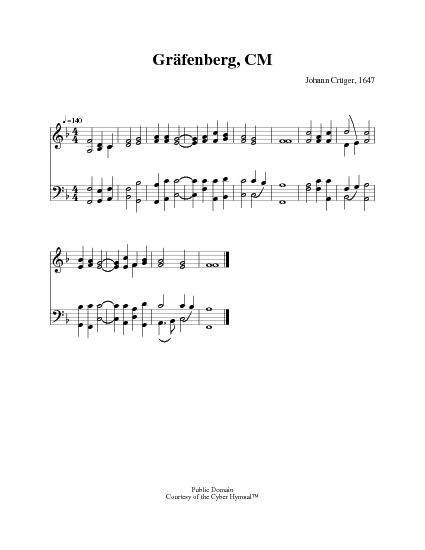A Choice Selection of Evangelical Hymns, from various authors #127
Display Title: Father of glory, to thy name First Line: Father of glory, to thy name Date: 1806
A Choice Selection of Evangelical Hymns, from various authors #127

1 Father of glory, to Thy name
Immortal praise we give,
Who dost an act of grace proclaim
And bid us rebels live.
2 Immortal honor to the Son,
Who makes Thine anger cease;
Our lives He ransomed with His own,
And died to make our peace.
3 To Thine almighty Spirit be
Immortal glory giv'n,
Whose teachings brings us near to Thee
And train us up for heav'n.
4 Let men with their united voice
Adore the eternal God
And spread His honors and their joys,
Through nations far abroad.
5 Let faith and love and duty join
One grateful song to raise;
And saints in earth and heaven combine
In harmony and praise.
Amen.
Source: The Lutheran Hymnal #248
 Isaac Watts was the son of a schoolmaster, and was born in Southampton, July 17, 1674. He is said to have shown remarkable precocity in childhood, beginning the study of Latin, in his fourth year, and writing respectable verses at the age of seven. At the age of sixteen, he went to London to study in the Academy of the Rev. Thomas Rowe, an Independent minister. In 1698, he became assistant minister of the Independent Church, Berry St., London. In 1702, he became pastor. In 1712, he accepted an invitation to visit Sir Thomas Abney, at his residence of Abney Park, and at Sir Thomas' pressing request, made it his home for the remainder of his life. It was a residence most favourable for his health, and for the prosecution of his literary… Go to person page >
Isaac Watts was the son of a schoolmaster, and was born in Southampton, July 17, 1674. He is said to have shown remarkable precocity in childhood, beginning the study of Latin, in his fourth year, and writing respectable verses at the age of seven. At the age of sixteen, he went to London to study in the Academy of the Rev. Thomas Rowe, an Independent minister. In 1698, he became assistant minister of the Independent Church, Berry St., London. In 1702, he became pastor. In 1712, he accepted an invitation to visit Sir Thomas Abney, at his residence of Abney Park, and at Sir Thomas' pressing request, made it his home for the remainder of his life. It was a residence most favourable for his health, and for the prosecution of his literary… Go to person page >| First Line: | Father of glory! to Thy name |
| Title: | The Doctrine of the Trinity, and the Use of it |
| Author: | Isaac Watts |
| Meter: | 8.6.8.6 |
| Language: | English |
| Copyright: | Public Domain |


 My Starred Hymns
My Starred Hymns